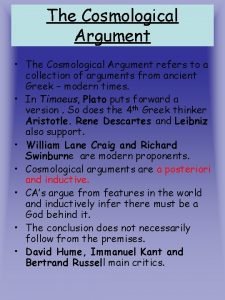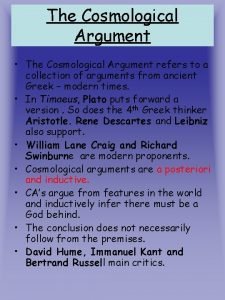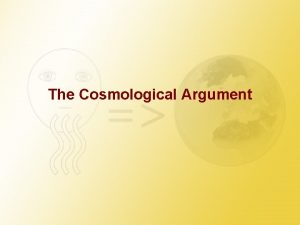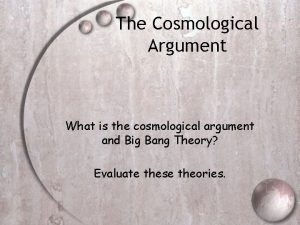Explore the key ideas of the cosmological argument


- Slides: 2

Explore the key ideas of the cosmological argument. (8 marks) A’posteriori The key crux Family of arguments Motion – everything moved by something else Need for first mover Cause – everything caused by something else Need for a first cause Stretch and Challenge Swinburne and cause Contingent beings cannot come from nothing Need for a necessary being If we can prove God created the universe, we can prove that God exists.

Explore the key ideas of the Cosmological Argument. 8 marks The Cosmological Argument is an a’posteriori argument meaning that it is based on empirical experience and observation. The key crux of the argument is that existence of the universe stands in need of explanation, and the only adequate explanation of its existence is that it was created by God. The cosmological argument is a type or family of arguments rather than a single one, but all the variants are based on the seemingly unobjectionable observation that everything that exists is caused by something else. A significant contributor to the argument was Aquinas and his first ‘Three Ways’ of demonstrating the existence of God form part of the argument. Aquinas’ first ‘Way’ was motion, he observed that everything in the universe is in motion and that something can only be in motion if it is first moved by something else that is already moving. Aquinas then took this further and concluded that to avoid an infinite regress, there must be a ‘first mover’, something that does not require to be moved by something else, and he believed this to be God. His second ‘Way’ was cause, he observed that everything that exists has a cause, nothing can be its own cause and therefore must be caused by something else. Again, he developed this further and concluded that to avoid an infinite regress, there must be a first cause, something uncaused by something else and Aquinas believed this to be God Stretch and challenge - This idea of cause was later further developed by Swinburne who distinguished between different types of cause: inanimate and intentional. Intentional causation is personal and motivated by belief and purpose-this thinking helps theists understand the world in relation to humans. Swinburne believed that God created the world for a purpose and the purpose was to sustain human life. Aquinas’ third ‘Way’ was contingency and necessity. Aquinas observed that everything in the universe is contingent and that contingent beings cannot come from nothing. This led him to conclude that there must be something outside of it all, a necessary being that does not rely on anything else for its existence, that starts the whole thing off and he argued that this was God. Aquinas’ Three Ways aim to show if we can prove that God created the universe then we can prove that he does in fact exist.



